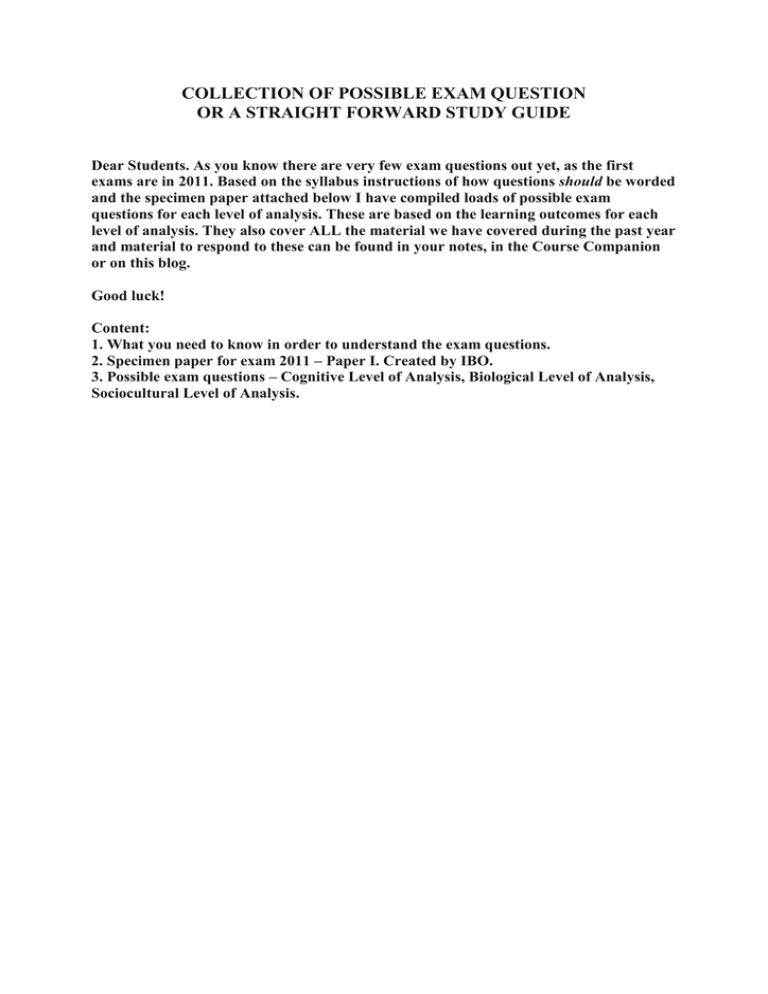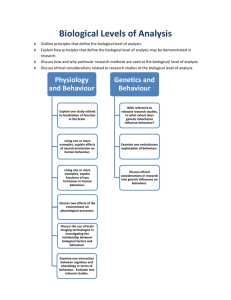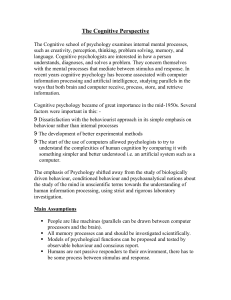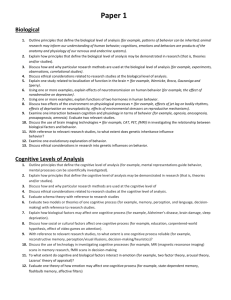collection of possible exam question
advertisement

COLLECTION OF POSSIBLE EXAM QUESTION OR A STRAIGHT FORWARD STUDY GUIDE Dear Students. As you know there are very few exam questions out yet, as the first exams are in 2011. Based on the syllabus instructions of how questions should be worded and the specimen paper attached below I have compiled loads of possible exam questions for each level of analysis. These are based on the learning outcomes for each level of analysis. They also cover ALL the material we have covered during the past year and material to respond to these can be found in your notes, in the Course Companion or on this blog. Good luck! Content: 1. What you need to know in order to understand the exam questions. 2. Specimen paper for exam 2011 – Paper I. Created by IBO. 3. Possible exam questions – Cognitive Level of Analysis, Biological Level of Analysis, Sociocultural Level of Analysis. What you need to know in order to understand the exam questions: There are three assessment objectives – these are what the examiners assess, namely: Knowledge and Comprehension (assessment objective 1) Application and Analysis (assessment objective 2) Synthesis and Evaluation (assessment objective 3) This means that in your answers you need to show that you have knowledge and understanding of the topic you write about (for example memory), that you can apply it and analyse its use (for example on Alzheimer’s patients) and that you can evaluate it – the strengths and weaknesses – how this knowledge could be developed etc (for example evaluation of research pieces or theories). ! Important to know is also that SAQs only asks for assessment objective 1 and 2 while you need to know all these objectives in order to fully answer an extended questions. Each objective has its own command terms: Define, describe, outline, state – these command terms are Objective 1 in order to test knowledge and comprehension. Analyse, apply, distinguish, explain – these command terms are Objective 2 in order to test application and analysis. Compare, compare and contrast, discuss, evaluate, examine, to what extent – these command terms are Objective 3 used in order to test synthesis and evaluation Eg. Objective 1 Outline principles of the biological level of analysis. Objective 2 Explain how one study demonstrates schema theory. Objective 3 Discuss factors influencing conformity. Important to know is that in each of the questions above, and also in all the questions that will follow in this document the command terms can be changed into others of the same demand (from the same objective) or from a lower objective, but not from a higher objective. So, if the question asks you to explain something it might as well ask you to analyse, apply, distinguish or explain it. But also, to define, describe, outline or state it. But not to compare, evaluate or discuss it. Extract from the syllabus: A command term used in an examination question will be: the same as that specified in the related learning outcome or another command term associated with the same assessment objective, or a command term of less cognitive demand. For example, if a learning outcome begins with the command term “explain”, an examination question based on this learning outcome could contain the command term “explain”, another command term associated with assessment objective 2 (such as “analyse”), or a command term associated with assessment objective 1 (such as “describe”), but not a command term associated with assessment objective 3 (such as “evaluate Specimen paper – for first examinations 2011 Created by IBO SECTION A Answer all questions in this section. Marks will be awarded for focused answers supported by relevant knowledge. Biological level of analysis 1. Explain how one study demonstrates localization of function in the brain. Cognitive level of analysis 2. Outline two principles that define the cognitive level of analysis. Sociocultural level of analysis 3. Explain one compliance technique. SECTION B Answer one question in this section. Marks will be awarded for demonstration of knowledge and understanding (including the use of relevant psychological research), evidence of critical thinking (e.g. application, analysis, synthesis, evaluation), and organization of answers. 4. To what extent does genetic inheritance influence behaviour? Use relevant research studies in your response. 5. Discuss the use of one research method (e.g. experiments, case studies) in the cognitive level of analysis. Use relevant research studies in your response. 6. Evaluate the role that one cultural dimension (e.g. individualism/collectivism, power distance) may have on behaviour. Possible exam questions – The Cognitive Level of Analysis Put together by Mrs. Berglund Persson These questions are by no mean exhaustive – variations are very likely to occur. 1. Outline principles that define the cognitive level of analysis 2. Outline one principle that defines the cognitive level of analysis and explain how it can be demonstrated in research. 3. Discuss how and why particular research methods are used at the cognitive level of analysis. 4. Discuss ethical considerations related to research studies at the cognitive level of analysis. It is very likely that the questions will be narrowed down to one piece of research or one/two research methods etc. 5. Evaluate schema theory with reference to research studies. 6. Evaluate two models or theories of one cognitive process/Evaluate one model of one cognitive process with reference to research studies. 7. Explain how biological factors may affect one cogntive process. 8. Discuss how social or cultural factors affect one cognitive procss 9. With reference to relevant research studies, to what extent is one cognitive process reliable? 10. Discuss the use of technology in investigating cognitive processes. 11. To what extent do cognitive and biological factors interact with emotion? This question is massive – it is therefore very likely that it will be worded ”cogntitive OR biological factors” instead. Or simply choose one: ”To what extent does biological factors interact with emotion”. 12. Evaluate one theory of how emotion may affect one cognitive process. Note that approximately half of these questions assess objective 3 abilities (asking you to discuss, compare, evaluate, judge to what extent something is true) namely question 3, 4, 5, 6, 8, 9, 10. For the rest of the questions it is enough to be able to show knowledge and comprehension (objective 1) and application and analysis (objective 2). Possible exam questions – The Biological Level of Analysis Put together by Mrs. Berglund Persson These questions are by no mean exhaustive – variations are very likely to occur. The first four questions are the same for all levels of analysis: 1. Outline principles that define the biological level of analysis 2. Outline one principle that defines the biological level of analysis and explain how it can be demonstrated in research/ Explain how principles that define the biological level of analysis may be demonstrated in research (that is theories and/or studies) 3. Discuss how and why particular research methods are used at the biological level of analysis. 4. Discuss ethical considerations related to research studies at the biological level of analysis. 5. Explain one study related to localization of function in the brain. 6. Using one or more examples, explain effects of neurotransmission on human behaviour 7. Using one or more examples, explain functions of two hormones in human behaviour. 8. Discuss two effects of the environment on phisiological processes 9. Examine one interaction between cognition and physiology in terms of behaviour. 10. Discuss the use of brain imaging technologies in investigating the relationship between biological factors and behaviour. 11. With reference to relevant research studies, to what extent does genetic inheritance influence behaviour? 12. Examine one evoluationary explanation of behaviour. 13. Discuss ethical considerations in research into genetic influences on behaviour. It is very likely that the questions will be narrowed down to one piece of research or one/two research methods etc. Question 1, 2, 5, 6, 9, 12 can only appear in SAQs using the command term in the question or another from the same objective or a lower one (see page 2). The rest of the questions can either appear in an Extended Response (using the command term in the question or an equivalent command term) or using a lower level command term. Possible exam questions – The Sociocultural Level of Analysis Put together by Mrs. Berglund Persson These questions are by no mean exhaustive – variations are very likely to occur. The first four questions are the same for all levels of analysis: 1. Outline principles that define the sociocultural level of analysis 2. Outline one principle that defines the sociocultural level of analysis and explain how it can be demonstrated in research/ Explain how principles that define the sociocultural level of analysis may be demonstrated in research (that is theories and/or studies) 3. Discuss how and why particular research methods are used at the sociocultural level of analysis. 4. Discuss ethical considerations related to research studies at the sociocultural level of analysis. 5. Describe the role of situational and dispositional factors in explaining behaviour. 6. Discuss two errors in attributions 7. Evaluate social identity theory, making reference to relevant studies. 8. Explain the formation of stereotypes and their effect on behaviour. 9. Explain social learning theory, making reference to two relevant studies. 10. Discuss the use of compliance techniques. 11. Evaluate research on conformity to group norms 12. Discuss factors influencing conformity 14. Define the terms “culture” and “cultural norms” This is an objective 1 question – very much like identify one principle of the sociocultural level of analysis. It may very likely be connected with a follow up for example asking you to describe the effect of cultural norms on behaviour. 15. Examine the role of two cultural dimensions on behaviour. 16. Using one or more examples, explain “emic” and “etic” concepts. These questions are quite specific often identifying how many errors or how many studies you are to choose. It is therefore difficult to come up with more variations than the obvious ones (replacing the command term explain with describe or outline etc.). Note that approximately half of these questions assess objective 3 abilities (asking you to discuss, compare, evaluate, judge to what extent something is true) namely question 3, 4, 6, 7, 10, 11, 12. For the rest of the questions it is enough to be able to show knowledge and comprehension (objective 1) and application and analysis (objective 2).







